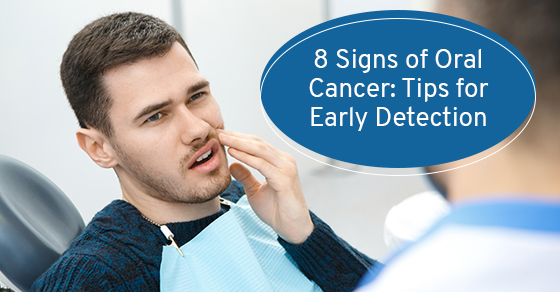Unfortunately, many Canadians are diagnosed with oral cancer every year. It is a type of cancer that is usually detected much later on, and sometimes this is due to neglecting to take early signs of the disease seriously. It’s important to understand the risk factors for oral cancer and the preventative measures that you can take to reduce your risk, such as practising good oral hygiene and seeing your dentist in Mississauga regularly for check-ups.
A good dentist will be able to detect signs of oral cancer and monitor your oral health over time. Oral cancer can develop in any part of the mouth and that includes the lips, tongue, gums and even on the roof of the mouth. In this article, we will discuss some of the most common signs of oral cancer so that you can be vigilant when it comes to practising better oral health.
1. Persistent sore throat
If you find that your throat feels sore often (and it’s not due to a cold or flu) there may be something else going on. A sore throat that won’t go away is one sign of oral cancer and if you experience this, you should see a doctor who will then be able to make a diagnosis based on other signs and symptoms. While a sore throat can happen to all of us, it really becomes a concern when it persists for longer than a week or two and constantly feels like something is stuck in your throat.
2. Loose teeth
Losing teeth or having loose teeth in your mouth is another indication of a bigger problem. A good dentist should be able to assess this at a regular check-up and notice if something is amiss. You may also notice while brushing your teeth or flossing if there is some wiggle room for your teeth to move. If you find that this is an issue, please speak to your dentist or doctor as soon as possible.
3. Pain in the mouth or jaw
Any time there is persistent pain in the mouth or jaw area, you should have it assessed by a medical professional. It may be that your persistent jaw pain is caused by an infection or some other dental problem but whatever the reason, it’s a good idea to have it checked out and get treatment if necessary.
4. Sores
Sores in the mouth are generally quite common and they often disappear after a week or two, especially if you rinse your mouth with salty water. However, sometimes a mouth sore can be an indicator of a more serious problem. If you notice persistent sores that don’t heal on their own you should seek medical advice from a professional who will diagnose the issue.
5. Lining in the mouth
Those who have oral cancer can develop a lining in the mouth that is thicker than usual. You can usually assess this for yourself when you brush your teeth, by looking inside your mouth at the lining of your cheeks.
6. Bleeding and/or numbness
If the inside of your mouth (gums, tongue, cheeks, roof) at any time feels numb, painful or starts to bleed without an obvious reason, this could be a sign or indication of oral cancer. While there could be other factors at play (bleeding gums after flossing, for example) you should not normally experience bleeding and/or numbness in the mouth. This would be another symptom that needs further investigation from your doctor.
7. Throat lumps
As with a persistent sore throat, if something feels constantly lodged in your throat it’s a good idea to get it checked out.
8. Vocal changes
Of course, colds and flu can cause a sore throat that often results in a raspy, hoarse voice. However, if you find that you’re losing your voice and you’re not sick, and you haven’t been talking non-stop, then it could be an indication of something more serious. Keep an eye on it and remember to check with your doctor if the condition persists.
Risk Factors
Always keep in mind that oral cancer can present itself as any one, or more, of the symptoms listed above. An experienced dentist will be able to determine whether your dental issues could be a cause for concern or if you are at risk of developing oral cancer in the future. Those who are especially at risk include people who have a family history of oral cancer, smokers, those who have HPV (human papillomavirus) and those who have had excessive exposure to the sun and UV rays. It’s important to discuss these risk factors with your doctor and your dentist and to ensure that they know your family health history as well.
Oral cancer can easily sneak up on you if you are not careful with your dental hygiene and if you delay seeing a dentist or medical professional after experiencing symptoms. Do the right thing by checking up on your oral health and investing in a dentist that will do the same.
For more information on the signs and symptoms of oral cancer, call Bristol Dental on 866-673-2109 or contact us here.






[…] people have minor signs of gum disease and, often, it goes undetected. It’s a good idea to ask your dentist or oral hygienist if they have seen any signs or symptoms […]